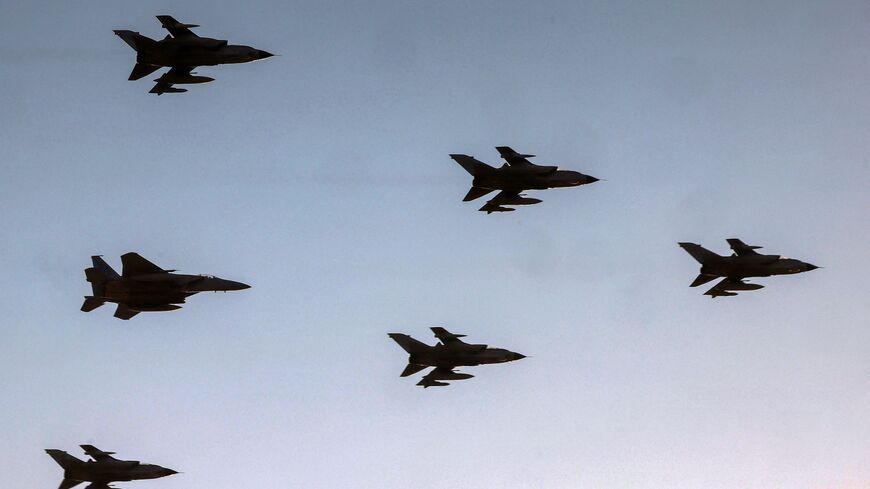This is an excerpt from Security Briefing, Al-Monitor's weekly newsletter covering defense and conflict developments in the Middle East. To get Security Briefing in your inbox, sign up here.
WASHINGTON — As the Biden administration touts a bilateral deal with Saudi Arabia linked to a historic normalization with Israel, Pentagon officials are working behind the scenes to firm up what they hope will be a cornerstone of Washington’s broader Middle East strategy for years to come.
Senior Pentagon officials sat down with Arab military brass in Riyadh on Wednesday to discuss expanding nascent Middle East air and naval defense coalitions in hopes of eventually containing Iran’s missile and drone overmatch over its neighbors.
The department’s top Middle East policy chief, Dan Shapiro, along with officials from CENTCOM and the Joint Staff, are leading the discussions with military representatives from all five Gulf Cooperation Council countries for the second annual round of defense working group meetings in the Saudi capital.
Biden administration officials aim to persuade Arab defense chiefs to expand their air defense radar arrays and share intelligence in order to better detect and shoot down Iranian-made projectiles which the Islamic Revolutionary Guard Corps has proliferated to militias across the region.
They also want to see Gulf states build up their navies' abilities to surveil and patrol regional waterways to help interdict the flow of advanced Iranian missile components to Yemen’s Houthi rebels.
The Houthis, like many of the militias backed by the IRGC, have echoed the Iranian government's hostility to the US military’s presence in the region and have either targeted or threatened to target Arab states in the Gulf that host US troops at local bases.
"Our basic message as we head into these discussions is we're stronger when we act together," a senior US defense official involved in the talks told reporters on the condition of anonymity on Monday.
Long-term efforts
The vision isn’t new. The administrations of George W. Bush, Barack Obama and Donald Trump all sought to convince Arab states to work together on air defense. Biden administration officials say this time is different, however, because Gulf states now recognize a distinct threat from Iran and its proxies.
Yet the current administration's strategic approach to the Middle East has faced skepticism in Arab capitals, with some seeing the 2021 US withdrawal from Afghanistan and halt to support the Saudi-led coalition in Yemen as signs of a minimalist approach from Washington at best.
Arab countries have also been diversifying their acquisitions of air defense systems in recent years, including with purchases of counter-drone systems from China, which US officials ultimately see as a challenge to Washington’s influence in the region.
Some Arab leaders in the Gulf have also been reluctant to directly share air defense radar data from sensitive military sites with each other, instead relying on the US Air Force’s Combined Air Operations Center at al-Udeid Air Base in Qatar to launder their radar data before passing it on to their neighbors.
At the previous US-GCC defense working group session in February of 2023, senior Arab navy officers questioned a pitch put forth by then-US Fifth Fleet commander Adm. Brad Cooper's to have Gulf states purchase their own fleets of unmanned sea drones, a move US officials say would exponentially expand their intelligence gathering in Gulf waterways.
This year, however, Pentagon officials are going into the talks in Riyadh with renewed optimism.
‘Newfound urgency’
Iran’s unprecedented aerial barrage of more than 300 drones and ballistic missiles fired toward Israel on April 13 gave “newfound urgency” to the discussions and “was ultimately successful in sparking deeper cooperation among our partners,” the senior US defense official told reporters.
Some 99% of the Iranian projectiles fired in the barrage were either shot down by Israeli air defenses and aircraft, or by US, UK, French and Jordanian fighter pilots supported by Saudi and Emirati air defense intelligence, or otherwise failed to reach their targets in Israel.
"That was the result of this extremely integrated and intricate and choreographed coalition effort to pool knowledge, resources [and] assets," the senior US defense official said, attributing the success to "investments, training and technology over many years.”
In private conversations with US Defense Secretary Lloyd Austin following the attack, Arab defense chiefs expressed “extreme interest” in advancing air defense coordination with Washington, according to the senior official.
“Iran's attack gave the world the opportunity to see what a partnership with the United States can mean,” the official said.
Next tasks
But much remains to be done. Before Arab militaries can shoot down Iranian projectiles for each other, they need to be able to detect them on the horizon, current and former military officials say.
A key focus of this week's meetings will be ways for Gulf militaries to boost their early warning radar systems, which played a key role in the US-led collective effort to blunt Iran's April 13 attack.
“Over time, we think the more integration there is in the region, in this domain, the better for everybody,” the senior US official said.
So far, the progress on Middle East air defense has largely been bilateral, with the US Air Force’s top command in the region at the center of a hub-and-spoke model of intelligence sharing.
On Monday, the United States and Kuwait agreed to expand their air defense integration. Other Gulf states are also seeking additional specific early warning systems to plug into their air and missile defense networks, according to US officials.
Jordan and other Arab states have already fielded Israeli early warning hardware, Al-Monitor has previously reported. On the role of Israeli technology, however, American officials have largely been tight-lipped on details.
The matter remains intensely politically sensitive for Arab states, whose leaders are wary of publicly associating with Israel amid the brutal war in Gaza that has killed more than 35,000 Palestinians. Despite intense criticism from Arab states over US support for Israel's massively destructive campaign, the conflict hasn't set back Arab military ties with the United States, officials say.
Pentagon officials under the Biden administration have also been pushing Arab states to ramp up their naval patrols and maritime surveillance in Gulf waterways as the United States Navy and its allies struggle to choke off the flow of Iranian missile components smuggled to Yemen’s Houthi rebels.
"We'll discuss the multilateral efforts to bolster information sharing, counterproliferation, ways to increase the effectiveness of combined interdictions and technologies to increase maritime domain awareness," the senior US defense official said of the talks in Riyadh on Wednesday.
Complications from Riyadh
In a twist, Saudi Arabia has restricted the US military's use of bases in the kingdom for launching airstrikes against Houthi targets in Yemen, in part out of concerns that it could scuttle its diplomatic effort to end its war with the rebels.
If Saudi Arabia and other Gulf states won't enable US and UK airstrikes to attrit the Houthis' Iranian-made arsenal, Pentagon officials hope they can support a new multilateral interdiction effort to cut off the rebels’ resupply lines, by sea and over land.
"There's work to do, by all parties — obviously including those in the region, who are very much affected by this violence — to try to diminish its impact and bring it to an end," the senior defense official said.
The behind-the-scenes push by the Pentagon makes up two legs propping up the Biden administration’s broader Middle East strategy, which officials admit has been rattled, but not undone, by Iran and its proxies’ attempt to exploit the Oct. 7 war between Hamas and Israel.
With the spread of the conflict largely contained, the US administration is doubling down on efforts to shore up regional defenses to neutralize Iran’s upper hand while pursuing diplomacy to avert any tit-for-tat escalation that could encourage Iran’s leaders to authorize a push to obtain a nuclear weapon.
Iranian overmatch
Meanwhile, the seemingly limitless supply of Iranian-made precision missiles and drones to militias in Iraq, Syria, Lebanon and Yemen has given Tehran an upper hand in its demands from the United States and US-algined nations in the region, one which both the Trump and Biden administrations have faced mixed results in their attempts to face down via diplomatic and military means.
US CENTCOM’s requests for US Air Force B-52 bomber task force overflights and extended aircraft carrier deployments during the Trump administration strained the Pentagon's maintenance cycles and failed to dissuade Iran-backed militias from a steady stream of pinprick rocket attacks on American bases and diplomatic facilities in Iraq and Syria.
While the Biden administration has failed to resolve Iran's nuclear enrichment via diplomacy, a combination of precision retaliatory strikes in Iraq and Syria with renewed warnings via the Oman channel appear to have helped restrain the militias.
Brett McGurk, Biden's top Middle East policy adviser, and acting US Iran envoy Abram Paley, led indirect talks with Iran's now-acting Foreign Minister Ali Bagheri Kani last week, Axios and the Washington Post first reported this week.
The talks came as Iranian officials have spoken increasingly openly about their technical capability to quickly pursue a nuclear weapon if ordered to do so by the supreme leader.
Publicly at least, Biden administration officials are sanguine that the contours of their Middle East strategy are nearly in place. The hope in Washington is that this will present Israel’s arena of political contenders with a chance at a strategic prize that no prospective Israeli leader could turn down.
As for whether the unexpected death of Iran’s president and foreign minister in a helicopter crash on Sunday could offer Washington a window for further detente with the Islamic Republic, Biden administration officials thus far appear reluctant to say.



